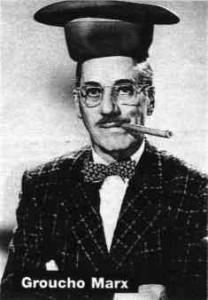Teaching with Humor
 Today is the first day of class at WCU. I’m not teaching this semester, and I know that I’ll miss it in some ways even though I will make good use of the time off.
Today is the first day of class at WCU. I’m not teaching this semester, and I know that I’ll miss it in some ways even though I will make good use of the time off.
Recently I was asked to submit a file for the Liberal Studies Teaching Award. The LS program is the core of WCU’s curriculum. There is a list of classes across most of the disciplines on campus (although it’s heavy on humanities). And there’s a faculty committee separate from the regular curriculum committees that oversees the program. I teach two LS courses a semester, including my upper-level Ethics of Capitalism class.
The application for the LS teaching award is intricate (max 50 pages!). Among its many sections, one asks for an “Explanation of best practices for teaching LS courses”. I dutifully wrote a couple of pages, with sub-headings like “Structured Assignments” and “Balance of Material” and “Experiential Learning”. But honestly, even though the process of writing the application gave me some genuine opportunities to reflect on my teaching in ways that I might not otherwise, I couldn’t shake the feeling that I was writing what they wanted to hear. So I kept editing and re-writing, making sure I could stand by it all. At the end of the section, I added this as my final “best practice”.
“Humor: On the wall in my campus office hangs a framed black-and-white photo of Groucho Marx, grinning with a cigar in his mouth and an upside down derby on his head. This is a reminder not to take myself (or economics) too seriously. While I may not be the funniest professor on campus, I do try to mix things up in class. I show funny video clips that help unpack dense material. I crack corny jokes and show pictures of my kids goofing off. I even perform tricks, like juggling tennis balls, to illustrate certain concepts (Adam Smith in his 1776 classic The Wealth of Nations talks about an “elaborate juggling trick”). I use humor partly for my own sanity, but students seem to appreciate it as well. God help us—or at least the ghost of Groucho Marx—if we cannot have fun while learning in the LS Program.”
Here’s to all my friends and colleagues at WCU, and all my students, hoping that you have an awesome semester. Let’s get the job done. And let’s keep it real with some humor along the way.
